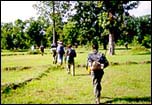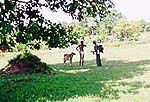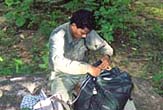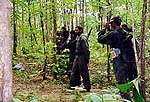
R, soon as we stop, puts a jungle flower to minute inspection and gets
stung by a wasp. He becomes a bit hyper about it.
"Kuch hoga (Will something happen to me)?" he asks anxiously.
The Naxals find this very amusing. G tries to console him, but Vishwanath
chooses the moment to tell him about other poisonous creatures of the
jungle that can prove deadly. R looks more worried.
The 10-minute rest over, we line up. This time the guerrillas lead us
across a couple of open fields -- an exercise they avoid as a rule --
which cuts our distance by more than 30 minutes.
As the guerrillas make tea, the conversation shifts to the Naxal movement
in Bihar. Vishwanath talks about the Maoist Communist Party. The fight
there is still in the initial stages, he says.
"They don't have enough weapons, and no training. One of our people
had gone there recently to train them. We sent them an AK and a few SLRs
from here," he reveals, "In DK, we have passed that stage. Here (unlike
Bihar where the biggest enemy of the movement is the landlords) the
State is our biggest enemy.''
H, meanwhile, is going about his photography. He has made good use of
the IV tube that Vishwanath provided him earlier -- the extra lens he
has with him is now slung on his shoulder, tied to the end of the tube.
R, I can see from the corner of my eye, is in deep conversation with
a couple of guerrillas. A little later he comes hurrying to where G and
I are standing. "You know what?" he says, breathlessly, "These people
take a bath only in 15 days!"
"When it is a question of survival, as it is the case with them, then
other things take precedence," G tells him. However, that doesn't stop
any of us from contemplating the possibility of a bath this evening.
G and I talk about the risk we are running and the chances we would
have if we ran into an encounter. The cops, we have learnt from the Naxals,
usually retreat only after their guns are empty. Yet, none of us seem
to be overtly apprehensive. We arrive at the conclusion that it is because
though all of us know the risks theoretically, it hasn't really sunk in.
That would happen only when we are fired upon.
We reach the periphery of Karan's camp at around 1700 hours. Two scouts
are immediately despatched to let them know about our arrival. We set
to wait their return.
An hour passes. There is no sign of our scouts yet. The guerrillas are
squatting, oblivious to the formation of mosquitoes that are attacking
us, lazily fanning them away with leaves. I try the same technique, but
the squadron that is concentrating on me is more ferocious than the rest.
Mere fanning produces no effect. I am forced to jump up and keep pacing.
The scouts return at 1845 hours. We meet our first woman guerrilla 10
minutes after that. Two of them are waiting just where we enter the camp,
with wide smiles and outstretched hands. Both are short and stocky, their
hair in a boy-cut.
"Lal salaam," they say, raising their right fists in air. I
am a bit confused at how to respond, but decide the best course is imitation.
"Lal salaam," I respond, feebly raising my fist.
The camp is set in a natural clearing, surrounded by trees on all sides.
Till you are actually in, you don't realise there is anything here. The
guerrillas are all lined up. They greet us with Lal salaams and
wide smiles. As we move past returning their greeting, they introduce
themselves: Murli, Saraswati, Indira... Karan.
Karan, the man whom I have been hearing about since I first contacted
the PW, is 33, of medium height, dark and wiry. Originally from Andhra
Pradesh, he has been with the movement for the last 15 years. Before coming
to DK about two-and-a-half years ago, he had been active in Telengana
and Karnataka.
Now he leads us to a plastic sheet spread on the ground.
"Tired?" he asks in Hindi, as his comrades offer us water, "Sorry I
couldn't come down to meet you. I was not well. Had to take an IV before
I could move down till here."
"What are your plans?" Karan asks, "How long can you stay?"
Arrangements have been made for us to stay till August 3. I tell him
I would like to stay as long as possible, but H, G and R are all for starting
back on July 28, immediately after the Martyr's Day meeting.
Karan says there won't be much of a celebration this time. In the light
of the huge meetings the PW had conducted in previous years, deep in the
forest, the police would be out in force. This year the repression (by
Naxal definition, any police action against them is repression) is more
than usual.
"You must cover us well," he tells R, trying to convince him to stay
back longer, "The local papers only publish the police version. Till now,
every news item about us has been fed to them. You must tell the people
the truth. Idharka log aap ka paper zyada padthe hain
(The people of this area mostly read your paper)."
It has grown dark now, and one of the guerrillas brings a candle. Next
to us, three women are sitting, listening to our conversation. Behind
Karan there is another outlaw, Arun, who is from West Bengal. Karan alternates
between Hindi and English, mostly English, which he speaks haltingly,
each word segregated by a slight pause, his accent heavily South Indian.
I am sure none of the outlaws around us, except Arun, follow the conversation.
Their presence appears more as Karan's bodyguards than anything else.
Karan is telling us about the increased police repression in the area.
According to him, atrocities on villagers have been rising in the past
couple of years. He tells us about two notorious police inspectors, Pandu
and Trivedi, who 'unleashed a reign of terror.' Both are alleged to have
shot many tribals in cold blood. The Naxals had their revenge on Pandu
when they killed him in an ambush. But Trivedi escaped as he was transferred
out of the region.
R interrupts to ask him how the villagers react when policemen are killed.
"They celebrate the occasion," Karan replies, "For instance, when Pandu
was killed, there was a lot of celebration in the villages. They congratulated
us wherever we went."
I ask him about Union Home Minister L K Advani's all-out move to eliminate
the PWG.
"The first enemy of communism is communalism," Karan says, "The BJP
and RSS are reactionary fascist forces. Now that they are in power, it
is only natural for them to start another round of repression. We expected
it. We will fight them. By increasing our mass base, by consolidating
our party, by extending it, and using guerrilla war techniques, we will
fight them."
We soon exhaust the immediate topics, mainly because all
of us are tired and hungry. I lie back, waiting for food. A little later,
there's a message for Karan. The sentry has seen a jeep in the village.
Cops? Karan calls for Vishwanath, instructs him in Gondi (the dialect
of the local tribes), and sends him to investigate. We wait apprehensively.
Will we have to run for it? That too on an empty stomach? The first halt is after 40 minutes.
There is nothing much to record, except that I had a narrow escape from
snake-bite. Because it didn't want the bother of turning around and biting
me, the reptile exhibited amazing speed in disappearing into the underbrush
seconds before I blundered on it. The incident left me a little shaken,
and with my raised right foot frozen in mid-air, but it taught me to watch
where I was stepping.
The first halt is after 40 minutes.
There is nothing much to record, except that I had a narrow escape from
snake-bite. Because it didn't want the bother of turning around and biting
me, the reptile exhibited amazing speed in disappearing into the underbrush
seconds before I blundered on it. The incident left me a little shaken,
and with my raised right foot frozen in mid-air, but it taught me to watch
where I was stepping.
 The
next halt is almost an hour later, just beyond a green field. In the corner
nearest to us, I can see a villager grazing a calf. Both are very matter-of-fact,
completely unimpressed by our little procession. When Ganesh approaches
him for water, the villager listens, nods and walks away. Is it fear that
prompts this unquestioned obedience? I don't think so.
The
next halt is almost an hour later, just beyond a green field. In the corner
nearest to us, I can see a villager grazing a calf. Both are very matter-of-fact,
completely unimpressed by our little procession. When Ganesh approaches
him for water, the villager listens, nods and walks away. Is it fear that
prompts this unquestioned obedience? I don't think so.
 It's
while I am trying to escape from under the weight of my rucksack that
its straps break. Not to worry, Vishwanath assures me, it will be fixed.
On his request, one of his colleagues removes a thick needle, thread and
a piece of canvas. By the time he finishes, it is stronger than before.
It's
while I am trying to escape from under the weight of my rucksack that
its straps break. Not to worry, Vishwanath assures me, it will be fixed.
On his request, one of his colleagues removes a thick needle, thread and
a piece of canvas. By the time he finishes, it is stronger than before.
 He
tells us there are two squads with us now. They had arrived at the site
only about 45 minutes earlier. Two women members are starting a fire near
where we are sitting to smoke green leaves and bushes -- this is the outlaws'
sole protection against mosquitoes.
He
tells us there are two squads with us now. They had arrived at the site
only about 45 minutes earlier. Two women members are starting a fire near
where we are sitting to smoke green leaves and bushes -- this is the outlaws'
sole protection against mosquitoes.
Page design: Dominic Xavier